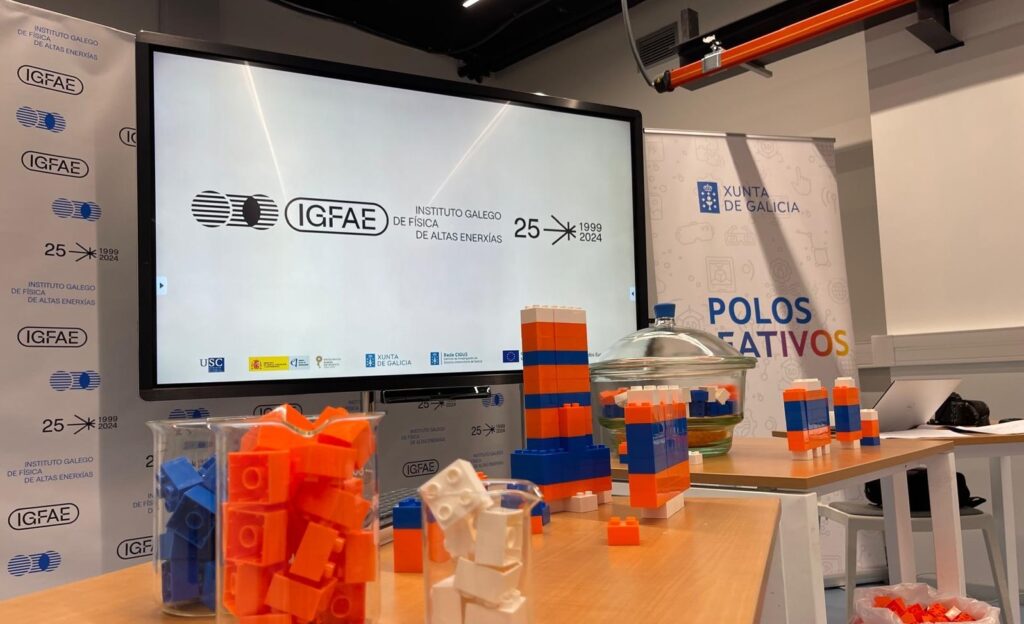The Xunta de Galicia (regional government) and the Instituto Galego de Física de Altas Enerxías (IGFAE) have joined forces to help students improve their knowledge of particle physics from secondary education. Through the Polos Creativos programme, promoted by the Regional Ministry of Education, Science, Universities and Vocational Training, and with the collaboration of IGFAE staff and its EduLab, the project ‘A materia peza a peza’, one of the largest didactic actions in particle physics carried out in Europe to date, was presented on Tuesday 5 November at the new headquarters of the IGFAE.
Around 40 participants from the Teacher Training Network took part in the activity, in which the 500 ‘matter kits’ were prepared. They will be later be sent to the more than 450 centres that teach secondary education in Galicia. There were, in total, around 215,000 building blocks, which represent the fundamental elements of the matter that makes up everything we know.
Proton, neutron and electron kits
🚀 Esta mañá presentamos no IGFAE ⚛️ “A materia peza a peza” 🧱 un proxecto para achegar a física de partículas ao alumnado da ESO en Galicia.
🤝En colaboración co programa Polos Creativos de @EduXunta, levaremos 500 ‘kits’ ata os centros de ensino.
E como o fixemos? 🧵👇 pic.twitter.com/TWWRHT7DE4
— ⚡ Instituto Galego de Física de Altas Enerxías ⚛️ (@IGFAE_HEP) November 5, 2024
Each of these bags consists of 420 building blocks, divided into three colours: 180 orange (representing the quarks ‘up’, 180 blue (quarks ‘down’) and 60 white (electrons). With these pieces it is possible to build protons (a combination of 2 ‘up’ and 1 ‘down’ quark) and neutrons (2 ‘down’ and 1 ‘up’ quark), which together with the electrons combine to represent atoms, their various isotopes and their aggregation into molecules.
In addition to bagging the kits, the training activity, introduced by Pablo Cabanelas, head of Innovation, Transfer and Knowledge of the IGFAE, allowed attendees to build some representative elements and molecules, such as hydrogen, helium, carbon-14, water or hydrogen peroxide.

O conselleiro de Educación, Ciencia, Universidades e FP, Román Rodríguez, participa na presentación do kit de Polos Creativos para escolares deseñado co Instituto Galego de Física de Altas Enerxías. Foto: Xunta de Galicia.
‘A materia peza a peza’ was presented by the Regional Minister of Education, Science, Universities and Vocational Training, Román Rodríguez, and the director of the IGFAE, Carlos Salgado, who stressed the importance of disseminating particle physics from an early age. ‘We want to stimulate STEM vocations, which are increasingly fundamental in our society. They seem like hard skills, but if they are done in a friendly, fun, practical, visual and manipulative way – as this Polos Creativos kit proposes – it is much easier for Galician teenagers to approach complicated issues such as these’, said the Regional Minister at the presentation.
EduLab
This collaboration with the Polos Creativos programme of the Xunta de Galicia is part of the IGFAE’s EduLab, a forum for exchange and creation with the educational community, which, together with the centre’s scientific staff, develops new projects that bring research closer to the early stages of academic training.
The EduLab promotes innovative, attractive and stimulating approaches that foster interest in physics and stimulate vocations in new people. In recent years, this laboratory of ideas has launched initiatives such as the Proxecto MEDRA or workshops for the construction of fog chambers.
